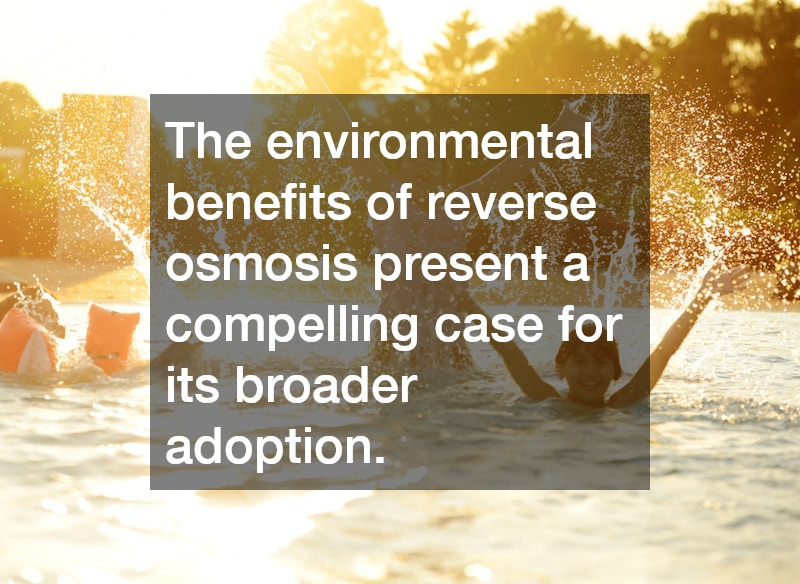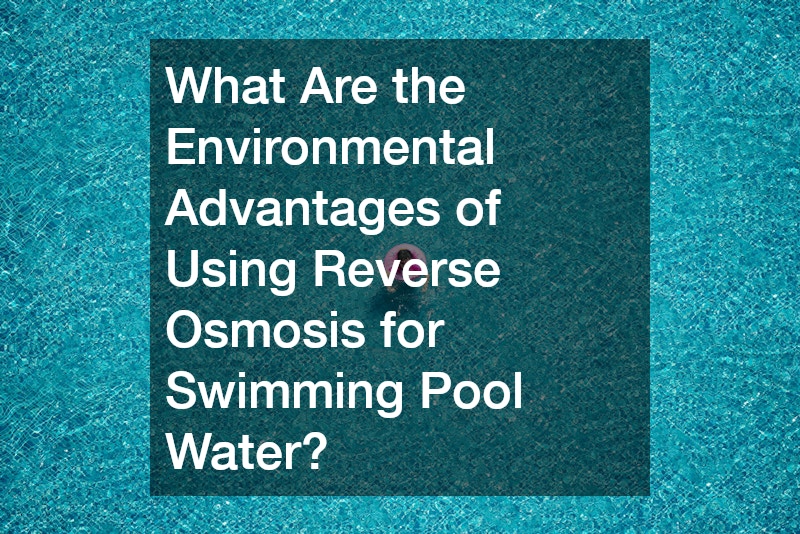Reverse osmosis (RO) is a water treatment process gaining popularity for its efficacy in purifying water. Traditionally used in drinking water systems, it’s now being applied to swimming pools, offering a range of environmental benefits.
As water scarcity and pollution continue to challenge many regions, finding sustainable pool maintenance methods is increasingly crucial.
This method involves the removal of impurities and contaminants from water by pushing it through a semi-permeable membrane. The result is cleaner, clearer water that requires fewer chemicals to maintain. This article explores how reverse osmosis can contribute positively to our environment when used in swimming pools.
Incorporating reverse osmosis in pool maintenance aligns with the global drive towards more sustainable practices. Environmental consciousness is driving both consumers and corporations to seek methods that reduce footprints while delivering efficiency. By understanding these benefits, pool owners can make informed decisions that support both their needs and environmental stewardship.
Chemical Usage Reduction
One of the primary advantages of using reverse osmosis in swimming pools is the significant reduction in chemical use. Traditional pool maintenance requires various chemicals to ensure water hygiene, which can have detrimental environmental effects. By using RO, the need for chlorine and other toxic chemicals decreases, reducing their release into the environment.
When fewer chemicals are used, their production and transportation also decrease, leading to reduced carbon emissions. Moreover, reduced dependency on chemicals means less packaging waste, which is another contributing factor to environmental pollution. Overall, RO offers a cleaner, safer alternative that helps in mitigating chemical pollution in our ecosystems.
Beyond the environmental benefits, using fewer chemicals also leads to safer water for pool users. This becomes particularly beneficial for sensitive individuals, including children and people with skin conditions. The health advantages align well with a wider push towards minimizing the use of synthetic substances in our daily lives.
Water Conservation
Water conservation is another critical benefit of using reverse osmosis for swimming pools. Standard pool maintenance practices often require draining and refilling as water becomes contaminated, necessitating extensive water use. Reverse osmosis systems allow for the purification and reuse of existing pool water, significantly decreasing the need for new water.
For areas affected by drought or water shortages, this capability is especially advantageous. It allows pool owners to maintain clean and safe water without exacerbating local water scarcity issues. By enabling more efficient use of water resources, RO systems play a key role in promoting sustainable water management practices.
The benefits extend beyond individual pools, contributing to broader environmental stewardship efforts. By conserving water, communities can reduce demand on local resources, easing the burden on aquifers and water treatment facilities. These effects help in safeguarding natural water bodies for future generations.
Energy Efficiency
Reverse osmosis systems can also enhance energy efficiency compared to traditional pool maintenance techniques. Typical methods often involve energy-intensive heating or filtration systems that continuously operate to maintain water quality. In contrast, RO systems are designed to optimize energy use while maintaining high levels of water purity.
By incorporating renewable energy options like solar-powered RO units, pool owners can further reduce their carbon footprint. These systems enhance sustainability by combining efficiency with the use of cleaner energy sources. Decreased reliance on non-renewable energy translates into a lower environmental impact overall.
Incorporating energy-efficient solutions aligns with broader environmental goals of reducing greenhouse gas emissions. As more pool owners embrace these technologies, they contribute to lessening the energy demand on our power grids. This is a practical approach to combatting climate change while benefiting from improved pool water quality.
Environmental Impact Minimization
Minimizing the overall environmental impact is a fundamental advantage of using reverse osmosis for pool water. Conventional pools can introduce contaminants into the environment through overflow, backwashing, and drainage processes. Reverse osmosis minimizes these outflows by consistently cleaning and reusing pool water.
This approach not only prevents pollution but also protects surrounding flora and fauna from chemical exposure. Local ecosystems often bear the brunt of excessive chemical use and water waste, so reducing these pressures is vital. RO systems offer a straightforward path towards achieving environmentally responsible pool ownership.
Furthermore, reducing the environmental burden of pools contributes to biodiversity conservation. Protecting habitats from chemical runoffs helps in maintaining the ecological balance. This encourages natural resilience and promotes a healthier relationship between human activities and the environment.
As technology and awareness grow, more environmentally friendly solutions like reverse osmosis will become standard in everyday applications. These positive shifts highlight the importance of innovation in addressing modern environmental challenges. By adopting smarter and cleaner practices, we can contribute to a healthier planet.
The environmental benefits of reverse osmosis present a compelling case for its broader adoption. By choosing this method, pool owners not only enjoy pristine water quality but also participate in global efforts to reduce environmental degradation. This transition to sustainable practices signifies a positive step towards a greener future.
.

